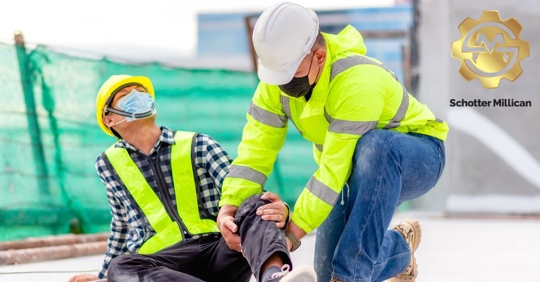Construction sites are inherently hazardous environments. With heavy machinery, dangerous tools, and elevated workspaces, accidents are, unfortunately, part of the risks many construction workers face daily. However, not all injuries are immediately apparent. Some symptoms may appear hours, days, or even weeks after the accident. Being aware of delayed injury symptoms could protect your health and ensure your rights to compensation are upheld.
Why Delayed Symptoms Occur
After an accident, your body often goes into “fight or flight” mode. The adrenaline and shock can mask pain or discomfort, leading you to believe that you’re unharmed. While you might feel relieved in the moment, delayed symptoms can emerge later, signaling hidden injuries that need medical attention.
Ignoring these symptoms could allow a serious condition to worsen or complicate your ability to seek compensation for your injuries. Timely action is essential for both your health and financial security.
Common Delayed Symptoms and What They Might Mean
1. Headaches
A headache might not seem like a big deal, but it could be a sign of something serious after a construction accident. For example:
- Traumatic Brain Injury (TBI): A blow to the head, even one that seemed minor, could cause a concussion, or in severe cases, a more significant brain injury.
- Whiplash: Sudden jerking movements during a fall or accident can strain the neck and aggravate nerves, leading to persistent headaches.
- Bleeding or Clots: Internal bleeding in the brain or blood clots can also manifest as delayed headaches, which can be life-threatening.
If you experience persistent or worsening headaches following an accident, seek immediate medical care.
2. Neck and Shoulder Pain
Neck or shoulder pain that arises later could indicate hidden musculoskeletal injuries. Potential causes include:
- Whiplash: Often associated with vehicle injuries, whiplash can also occur during falls or collisions on construction sites.
- Soft Tissue Injuries: Strained ligaments or muscles may not show pain right away but could worsen over time without proper care.
- Herniated Discs: Delayed pain in the neck or shoulders could be a sign of damage to a spinal disc.
These injuries may require physical therapy, medication, or even surgery if not diagnosed in time.
3. Back Pain
Back pain is one of the most common delayed symptoms after an accident. It can result from a variety of conditions, such as:
- Spinal Injuries: Herniated discs, fractures, or nerve damage in the spine are common among construction workers who experience falls or heavy lifting accidents.
- Soft Tissue Damage: Muscle strains or sprains may not cause immediate pain but can worsen as inflammation sets in.
- Internal Injuries: Organ damage caused by trauma can radiate pain to the back, indicating a need for immediate attention.
Back pain should never be ignored, especially for those in physically demanding jobs.
4. Abdominal Pain or Swelling
Abdominal discomfort could signal hidden internal injuries from blunt force trauma. For example:
- Internal Bleeding: Bruising or swelling in the abdomen may indicate internal bleeding, which can escalate quickly and become life-threatening.
- Organ Damage: Your liver, spleen, or kidneys could be injured, causing delayed symptoms like tenderness or swelling in your stomach area.
Seek emergency medical care if you experience abdominal pain, especially if it’s accompanied by dizziness, fainting, or nausea.
5. Numbness or Tingling
Numbness or tingling in your arms, legs, hands, or feet might initially seem insignificant. However, it could indicate nerve damage, such as:
- Pinched Nerves: This could result from swelling or bone misalignment following an injury.
- Spinal Cord Injuries: Herniated discs or trauma to the spine may compress nerves, leading to sensations of numbness or tingling.
Left untreated, nerve damage could become permanent.
6. Behavioral or Cognitive Changes
Mood swings, memory problems, or difficulty concentrating might indicate a deeper issue, such as a traumatic brain injury (TBI). Even a mild concussion can lead to these changes. Some warning signs include irritability, forgetfulness, and trouble sleeping.
These changes might seem minor but could significantly impact your ability to work or maintain relationships.
What to Do If You Experience Delayed Symptoms
If you notice any of these delayed symptoms, here’s what you should do:
- Seek Medical Attention Immediately
Even if the symptoms seem manageable, consult a medical professional. They can perform tests to identify hidden injuries and ensure you receive proper treatment.
- Document Everything
Keep a detailed record of your symptoms, medical appointments, and treatments. This documentation can be critical if you pursue a workers’ compensation or personal injury claim.
- Report the Accident to Your Employer
If you haven’t already, notify your employer about the accident as soon as possible. Provide written documentation to ensure there’s a record of your injury.
- Consult a Legal Expert
Navigating workers’ compensation laws can be overwhelming, especially when dealing with delayed injuries. An experienced work injury attorney can guide you through the process and help you receive the compensation you deserve for medical bills, lost wages, and other damages.
Take Control of Your Health with a Construction Workers’ Compensation Attorney in NYC
Construction workers often have a “tough it out” mentality, but when it comes to accidents, this mindset can do more harm than good. Delayed symptoms after a construction accident are your body’s way of signaling that something is wrong. Ignoring them puts your health at risk and may jeopardize your ability to claim compensation.
If you’re an NYC worker who's been in a construction accident, don’t wait to seek medical and legal help. Protect your well-being and your future by taking action today. Schotter Millican, LLP is here to help you file your claim, appeal a denied claim, or navigate any related workers’ compensation matter. Our New York City construction workers’ compensation attorneys can be your advocate in this challenging time.
Contact us now at (718) 550-0610 for a free case review. We can help you seek the right support and guidance, which can make all the difference.

